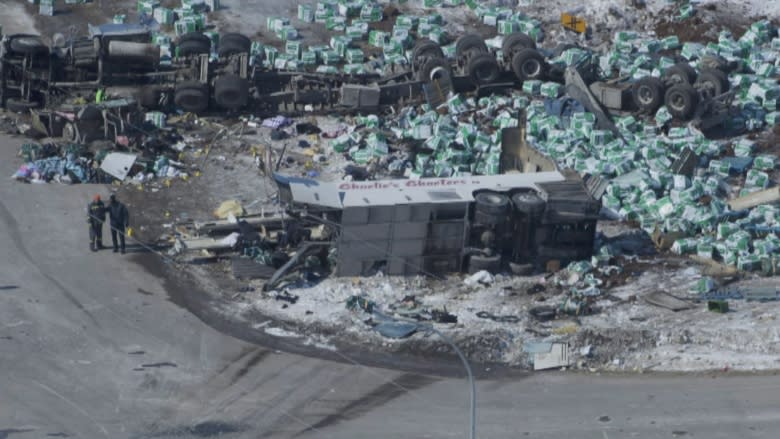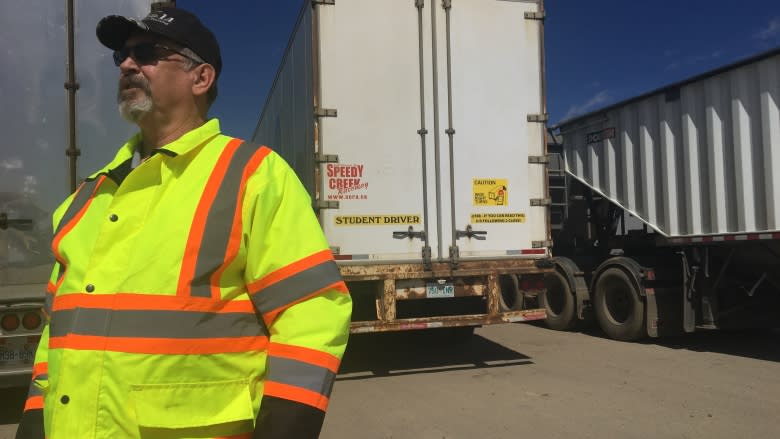'Anyone with a pulse' can pass: Semi-trailer driving tests in Canada too easy, instructors agree
Reg Lewis says it's time to expose the "dirty secret" of the trucking industry.
Lewis says he and other driving instructors are knowingly sending hundreds of ill-prepared semi-trailer drivers onto Canada's highways, grid roads and city streets every year.
Lewis says they have no choice — instructors aren't allowed to fail a student who can pass the most basic written and road exams, which many of them describe as a "joke."
The rules are similar in nearly every province, according to the to Canadian Trucking Alliance, including Saskatchewan, site of the recent collision between a semi and the Humboldt Broncos bus that left 16 dead.
"I'm hog-tied by what I can do. It's not safe," the Swift Current, Sask., man said.
Lewis is not alone. Kinley, Sask., instructor Mel Meikle said he quit several years ago, overwhelmed by frustration and guilt.
"If you go out there and kill someone, that's on my shoulders," Meikle said.
'Anyone with a pulse'
The written and road exams are far too easy, they say. Meikle said almost "anyone with a pulse" can get their Class 1 licence. The statistics appear to support their claims.
According to Saskatchewan Government Insurance, 73 per cent of the 2,051 students who took the test last year passed on their first try. SGI allows students to retest as soon as they can book an appointment, and it seems most do.
Roughly three-quarters of students pass on their second try. For the shrinking fraction that still need to keep coming back, passing rates for the third, fourth and fifth attempts are 67, 68 and 79 per cent respectively.
The one student who took the Class 1 exam for the eighth time last year passed.
Don't have to train
The majority of these students pay to take a week or so of training. But more than 200 of them took no training at all, according to SGI.
That's because they don't have to.
Last year, Ontario became the first province where any training is mandatory. Drivers must take a minimum of 103 hours, or roughly three weeks, of training. In Saskatchewan and elsewhere, training remains optional.
"I want to reassure people we're working on it," Saskatchewan Government Insurance Minister Joe Hargrave said.
Lewis, Meikle and more than a dozen others inside the trucking industry interviewed by CBC News are skeptical. They say they're speaking out so that something good can come from the Broncos crash.
The tragedy affected Lewis deeper than most, taking his mind back to another highway nightmare.
Nearly 30 years ago, just outside Medicine Hat, Lewis's parents and three other family members were killed in a head-on collision with a semi. Lewis started a business dedicated to training and testing truck drivers.
"I said I'm going to do everything I can to prevent that from happening again," he said.
Lewis and others are contracted by provincial governments to train and test for the Class 1 licence required by semi drivers.
'Work smarter, not harder'
On a recent sunny afternoon, Lewis and a student pulled out of a Swift Current truck stop for some road training. Swift Current is approximately 240 kilometres west of Regina.
The young student can't complete a right turn on his first try in the city's industrial area and blurts, "I feel like an idiot."
"That's OK. That's why we have a big sign saying Student Driver," Lewis replies.
Stopped on a grid road, Lewis tells the student to take a left turn back onto the main highway. The semi begins to inch forward.
"Whoa," Lewis says and the student hits the brake. "Those cars are coming over that hill at 100, maybe 110, K an hour. You think you could have made that?"
"Well, maybe if …" the student begins.
"It's always better to wait unless you're sure," Lewis says.
Later that day, Lewis says that young farmer is typical. He's intelligent, has some background driving heavy machinery, but clearly needs more practice.
Despite this, Lewis says he'll almost surely pass the exam after his final hour of training the following week. He'll then be free to take a load of maximum weight anywhere in Canada, east to Toronto's 16-lane 401 Highway or west through the winding, often slippery roads of the Rocky Mountains.
Minister promises changes
In Saskatchewan, Hargrave said he was surprised to hear that instructors feel they're forced to pass some students.
"They should be failing them. That's unacceptable to me," he said, pledging to look into the matter.
Hargrave said changes are coming. He extended condolences to the families involved in the Humboldt crash, but said they've been working hard on the issue since last summer.
They hope to improve the training courses by the end of 2018. He's "optimistic" training will eventually become mandatory, but there's no time frame for that.
Hargrave said they can always do more, but feels the roads are safe. As for those drivers hitting the road with no training, Hargrave noted they do have their general Class 5 licence for smaller personal vehicles.
"You've got to remember," Hargrave said. "Driving is not new to them. Driving a semi is new to them."
The number of semi crashes is on the rise in Saskatchewan. Until 2009, the record number of collisions involving semis never exceeded 943 per year. It's been well over 1,000 ever since.
Those numbers will keep rising until real changes are made, said Lewis and Meikle.
That means mandatory training. That means a tougher exam. For those who pass, that also means restrictions on load size or distance in their first months on the road.
More than a dozen long-serving semi drivers who contacted CBC News agree. And so does the national association representing trucking companies.
Truckers want mandatory training
Canadian Trucking Alliance President Steven Laskowski and others said many companies are ethical, gradually easing their new drivers into more complex jobs. But current rules do nothing to deter the growing number of "rogue" operations.
"We're not happy with the situation, but it's the reality," Laskowski said.
Regina instructor Vince Tremblay says mandatory training is long overdue, and a Class 1 licence should just "open the door" to further training.
Some suspect provincial governments are reluctant to impose mandatory training, because they may have to subsidize it. But they already do that for dozens of occupations in universities and colleges that don't have life and death consequences.
"It's a small price to pay," Lewis said.
As for the Humboldt Broncos crash, no charges have been laid. RCMP say the investigation is continuing and could take months.
Lewis said he doesn't want to speculate on that tragedy, but hopes it will serve as a wake-up call for the trucking industry. He and other drivers say they feared it might take the "big one" to create the momentum for change.
"Every year, it's getting less and less safe out there," Lewis said.
"Lives are at stake."





